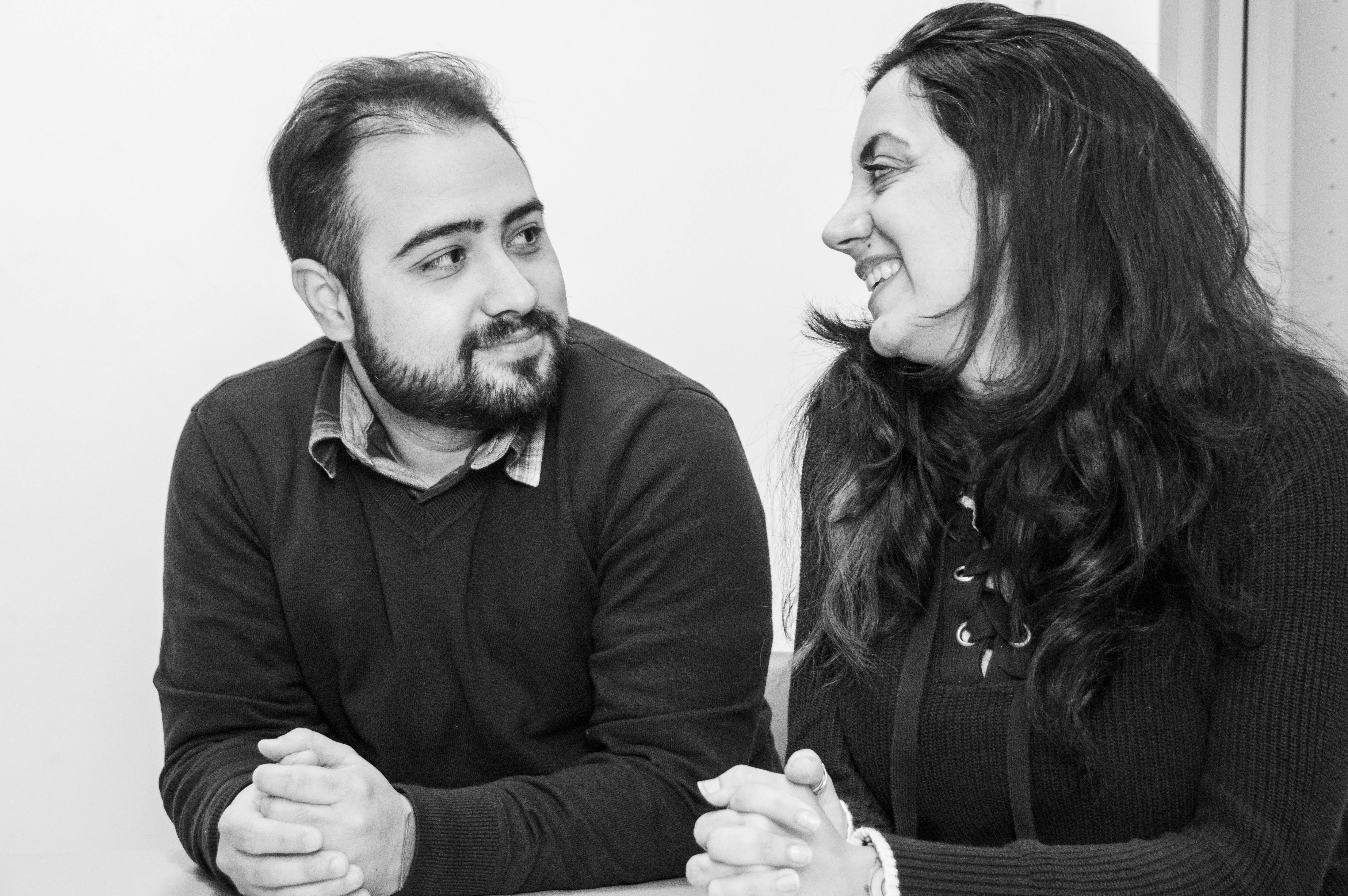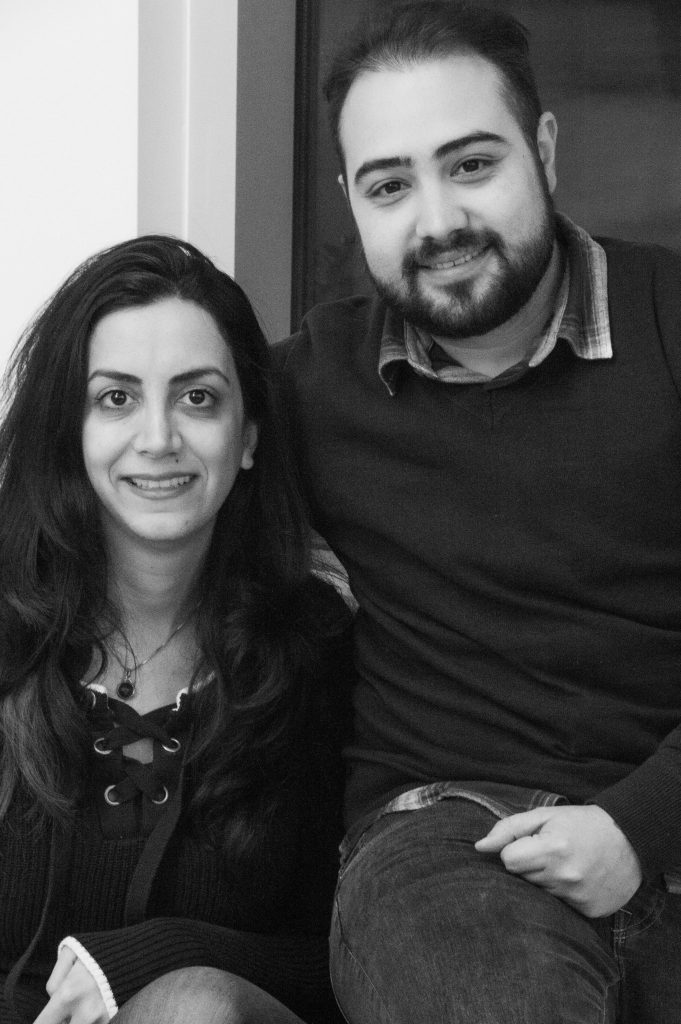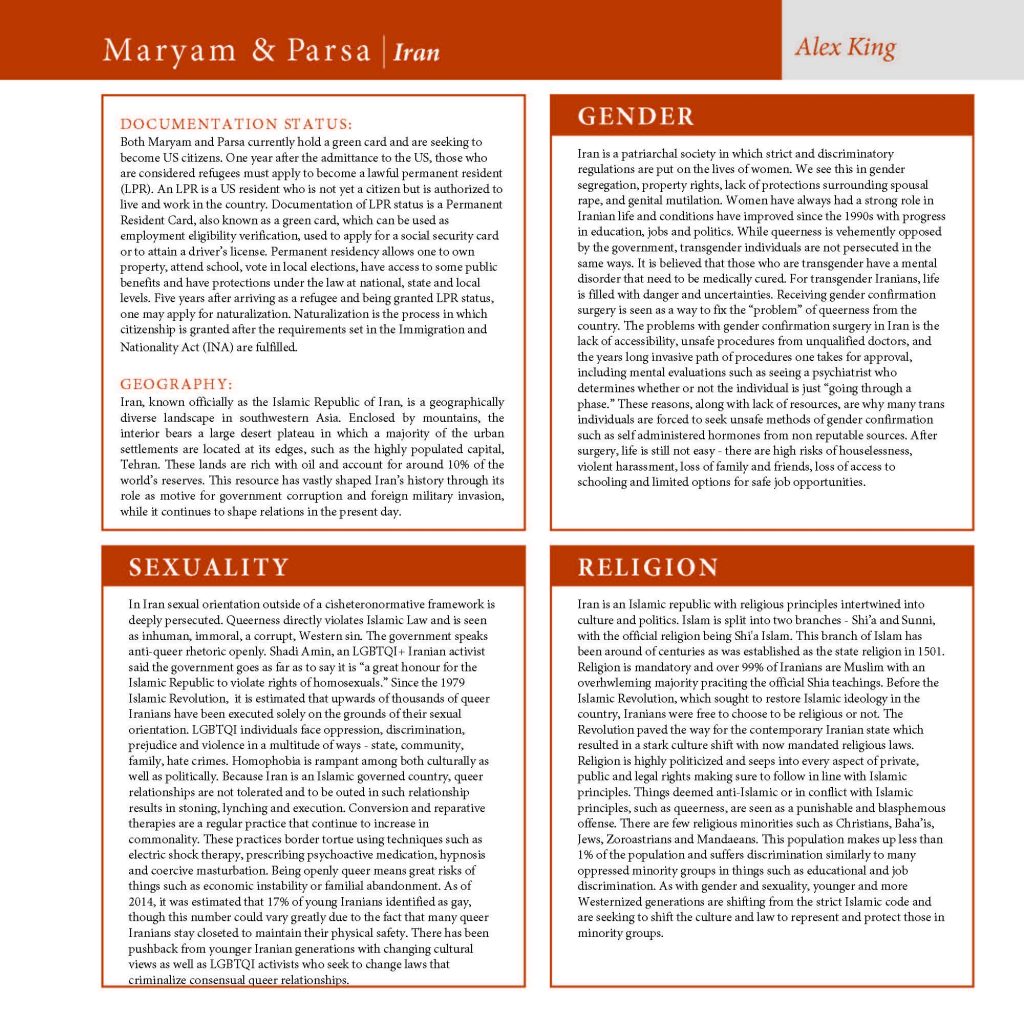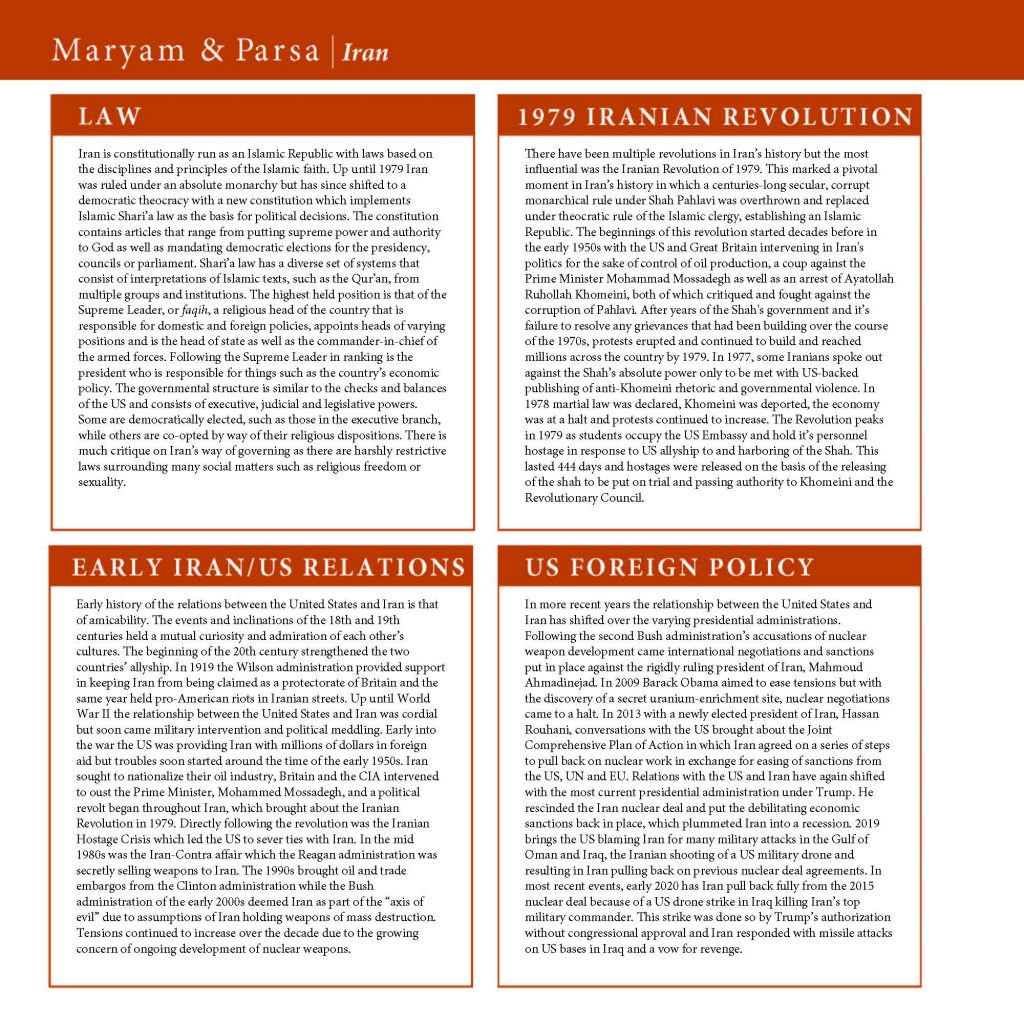
Parsa: I came to the United States November fifth of 2016. I am from Iran. It is an Islamic country. I was studying and working there.
Maryam: I am thirty years old. I came at the same time, November fifth, 2016. I was studying there in Iran and we were partners at that time. I identify as a queer person and Parsa is a transgender man. We had a problem. With our relationship in our country, because it is an Islamic country, there are lots of punishments.
Parsa: Transgender people who didn’t do the surgery, if they are men then the punishment is execution. And for a woman who wants to be a man it is stoning. If they don’t want to do the surgery they cannot come outside without the forced veil. They don’t have permission for driving, for leaving the house. The surgery is a very important part of this. If you identify yourself as a transgender person the government accepts you if you want to do the surgery but otherwise you are classified as gay or lesbian, which has punishment. For gay people it is execution; for lesbians it is stoning. It is different for men and women because of the rules.
Maryam: They are hanging women too, but most of the time they are stoning women.
Parsa: When I was sixteen I realized that there was a difference between me and other girls in the school. I had a lot of problems with the school. My family understood that. They sent me to therapy to try to change my mind. It was conversion therapy. It wasn’t until I was eighteen that I understood that there was surgery for transgender people. I am different. I thought I was a lesbian, but then I understood about the surgery and I knew the only option I had was doing the surgery. If I had lived in a place with different laws I would have wanted to do the surgery, but maybe with more research and better results, or maybe I would have given myself more time to think about it. I didn’t wait to find a better surgeon. I just wanted to do it to be able to go to university, to have a normal life. Without the surgery I couldn’t be public or study or have a job. It was very difficult to do the surgery without money or support or information about which surgeon could do the surgery. At that time there was just one surgeon. He was doing it secretly, not public. I found out that he had not done the surgery before. I was the first one. It didn’t have good results because the surgeon didn’t have experience. I didn’t want the therapy to work, but I had to go. My parents weren’t supportive of the therapy. They preferred me to be a lesbian rather than a transgender man. If I changed my gender they thought that I was changing myself. They thought that their daughter doesn’t exist anymore.
Maryam: May I add something? There are differences between cultural acceptance and the laws. In Iran, being transgender is accepted by the government but in culture it is different. People more easily accept being gay or lesbian, but they cannot accept transgender people, especially transgender women because our culture has male privilege. Even though Parsa did surgeries and changed his documents, he had difficulties living in Iran because on his ID there is a note that he had the surgery. If he wanted to apply for any job they didn’t accept him because it is not culturally acceptable being transgender.
Parsa: Also on my driver’s license there is a note that I have a psychological disorder. So if the police stop me they understand that I am transgender.
The surgery was something I had to pay for. It is not as expensive as here. It is hard to compare. I could afford it, but in a very bad hospital with a very bad surgeon. I grew up on the poor end of the middle class. I have two sisters. I lived with my parents until I was sixteen, but some of the time I was living with my grandparents. After doing the surgery I lived with my grandfather. He was more accepting. He was a person who worked in the army and he liked having a boy in the family. He preferred me as a boy. All of the children were girls. The military has a different character, the discipline. My dad wasn’t in the military, didn’t have any specific job. And my mother took care of children, had daughters. I lived in Tehran.
Maryam: I was born in Tehran but my family moved to a small town in the north of Iran about three years before I left Iran. I started my university in that town. I was studying at that university until one of my classmates found out that I was in a relationship with a transgender man, that I identified myself as a queer person. I was scared of being stoned so I decided to leave my family and my university and my country. At that time one of my social media applications had a peace sign with rainbow colors. My classmate went to the head of the religious community in the town, a person who decides about the rules. There were documents about the sins of having a relationship with a LGBTQ person, about being a lesbian. He provided this information to my university.
Parsa: Before that I had a problem in my university and my job. I was studying civil engineering. I was surveying coal mines in a small city in Iran. I couldn’t find a better job because every time I applied for a job they saw transgender on my documents. I left my job and bought an airplane ticket to Turkey and applied there to come to the United States. I applied to be a refugee and finally they gave me an American visa, in Turkey. There is no UNHCR (United Nations High Commission for Refugees) in Iran. I was thinking about going to Canada and I heard that other transgender people had gone to Canada to do their surgeries. I had planned to go to Canada but when I applied Canada was not accepting any more people from Iran, just from Syria. The US was accepting people from Iran then, but not now. Nobody accepts refugees from Iran right now.
Maryam: Parsa left Iran nine months before me. I didn’t want to leave Iran. I was studying but because of the situation I decided to leave as soon as I could. I joined in Parsa’s application. We got married in Turkey and all of our applications were together.
Parsa: We met each other through one of our friends who is transgender. We were together for three years before coming to the US.
Maryam: Two and a half years.
Parsa: We couldn’t come together because her family didn’t accept it.
Maryam: They thought it was a lesbian relationship, which is not acceptable. I had had other relationships, but with cisgender men. My family knew my friend, which was the connection between us, and they knew that he was a transgender man. I can’t say that they could accept that person, but because he wasn’t any relation, just a friend, it wasn’t dangerous. My parents understood that Parsa was also a transgender man so they told me if you want to be with him, you need to leave us and our country because we don’t want anybody else to know about this relationship. We don’t want our family or friends to understand that he is a transgender man. They had a lot of shame. They also left that town and returned to Tehran because it was difficult for them. In the small city everybody understood I had a relationship with Parsa. I communicate with them but I can say that it is not as close as it was before. I went to visit for my brother’s wedding last year.
Parsa: I don’t go back to visit. I don’t know what will happen if I go back. Probably there is no record of me. I don’t want to go there. I prefer to be safe here. Maybe after I get my citizenship. Right now I am just a refugee. I don’t have citizenship so there is a possibility that there might be a problem for me. We have a green card. I plan on becoming a citizen to have equal rights, to feel more safe. Right now I think there could be a time when I could not continue to be a resident here, but citizenship can guarantee my situation.
Maryam: I am also pursuing citizenship because a green card is not for a long time. After it expires we wouldn’t have any other place to be.
Parsa: When I went to Turkey, on the first day I went to a branch of the UNHCR and applied to be a refugee. I could not stay in Istanbul or Ankara. I had to be in a small city so I couldn’t affect other Turkish people in big cities. They thought the refugees had bad influence. I was there two years and one month. After a month they asked me to come for a short interview to ask me about my situation in Iran. I had to write what happened to me in Iran. They gave me an appointment for one year later. In the meanwhile the only thing I could do was live and wait. Maryam came nine months after. I was working illegally because I couldn’t work legally. I worked in a cafe in one of the industrial areas, but it was a cafe that was delivering tea to Turkish industrial workers. It was a job delivering tea by bicycle. They didn’t give homes to refugees. We didn’t have any help from government, even food. Nothing from government. Turkish people didn’t like to rent their homes to refugees. It was difficult to rent there. After one year waiting we went to our appointment and they asked us what our relationship was and what our situation was and after four months they reviewed our documents and we had another interview in which they asked us which country we wanted to go to, between Canada and the United States. They told us that Canada, at that time, was not accepting refugees. So they told us that we could wait maybe years, or we can send your application to the United States. It was with the UNHCR.
Maryam: At first we had interviews with UNHCR and then we had two interviews with the United States embassy.
Parsa: All Iranians cannot go through this process. They can go to Turkey and apply to be a refugee but usually they just accept people who are transgender or people who changed their religion to be Christian. Or maybe some people who have difficulties in their country who had to escape. The process is the same or maybe the time waiting is different.
Maryam: Because UNHCR usually works with Canada and the United States, they don’t work with people who want to go to European countries. Usually those people go illegally. They think it is faster.
Parsa: It took maybe six months after the interviews with the US. We had to go to medical appointments to make sure we don’t have any diseases. After that they gave us a flight date.
We came here and we learned English through the PCC ESOL program. When we came here they gave us one thousand dollars for living here. They told us that they cannot rent a home for us separately so that we had a home with another family. We had difficulty because one week after we came here we woke up at midnight and there was flooding, from the drain pipe. It was the basement. A lot of rain came through. We moved with the help of one of my friends that lives here. We changed our home and we didn’t have jobs. We had just the thousand dollars and they took all of that for paying our rent. I came to PCC and found my job at PCC in the cafeteria. Then I could pay my rent after that.
Maryam: Actually, when we came here we had to go to some of the English classes at IRCO (Immigrant Refugee Community Organization), but the main goal was finding a job for us. I don’t want to say that they didn’t want us to start education but they thought starting education would prevent us from finding a job. I remember that they told us that you might hear from your friend that there is a place named PCC. Parsa started his job at the cafeteria which was very lucky. They had another position. The cafe manager told Parsa that they had another position and that he could tell his wife. So I came here and I could start my ESOL. Very lucky.
Parsa: We knew some other transgender people from Iran in Portland. They told us that we needed to go to a city where I had a person that I knew, that could show me the city.
Maryam: For example, show us how to go for social security, finding a job, finding a home.
Parsa: I had a friend who lived in Seattle, but I prefer to come to Portland because I heard that my friend had his surgery here. I had six surgeries here, in one year.
Maryam: I remember one of Parsa’s experiences that stayed with me. Parsa looks like a cis man. In Iran if people knew he was a transgender man, they always told him that he didn’t look like a transgender man. When we came here we were surprised that people didn’t say to him that he didn’t look like a transgender person.
Parsa: When we came to the US, not only have people not had any reaction when I disclose my identity, but also they have been nice to me. It was very different from my experience in Iran where I have always been afraid of people’s reaction when they find out that I am a trans man. If they wanted to show that they could accept me as a friend or a person in the Iranian community, their best reaction was telling me “You don’t look like a trans person at all, you are very normal and look like a man.” There I learned that when I look more masculine I can be more proud of myself. This difference of people’s reaction between these two different countries was making me to think that I might not look like masculine enough in American society since they do not wonder when I say I am a trans man. It took time for me to understand the difference of reactions is because of how people want to be nice or they are actually nice enough to accept people’s differences
Maryam: It was very welcoming community here, especially here at PCC. We didn’t experience many discriminations against our race or our identities. I know that some of our friends started their jobs in different places they experienced some discrimination based on race.
Parsa: My friend was working at a local coffee shop at the Gateway Transit Center and she worked there and sometimes people said to her that she had the job that our children deserved to get.
Maryam: She said that people said something to her because she wasn’t an American.
Parsa: We both grew up religious. My family is Muslim, but I don’t believe in it.
Maryam: I think that they always say that they are Muslim, but they always say that Muslim people should, for example, wear hijab but they don’t. Being Muslim is mandatory in Iran so they have to have a religion. We have to be Muslim.
Parsa: The revolution affected our lives. Our culture was different before the revolution; maybe before the revolution I wouldn’t have had to leave my country. We were affected by big countries like Russia or the United States. After that Iraq-Iran war everything got worse. Hijab was mandatory. The government was changed so many things were forced. The Islamic government wants people to have to do that. Before the revolution they were free to do things. Maybe there was not as much justice in that time, but it was better than now.
Maryam: Because of our current government, all of the laws are based in Islam. After the revolution they separated the girls and boys schools. Parsa had to go to a girls school.
Parsa: The first trans person who did her surgery in Iran, her name was Maryam Khtoon Molkara. She got her permission for getting surgery from Khomeini. She killed herself six year ago. Many LGBT people try to live. I know transgender people who live in Iran but they don’t express themselves. It is the same for gay and lesbian people. It is secret. They stay because of their family, but sometimes they prefer to find a way to escape. Some people don’t have enough money to leave.
Maryam: Even if they want to go, all of our friends who went to Turkey, the processes have stopped and they are in Turkey for more than four years. They don’t have any choices. If they go to Turkey they can’t do anything.
Parsa: The process of immigration is different right now. Many of my friends who came before me to Turkey are still there because they can’t leave Turkey.
Maryam: At first I felt very safe in coming to the US. I work at the QRC, and when I started my job I had a task to research Trans Day of Remembrance events. I found that there is lots of discrimination here. Before I came to the United States I thought this was a safe place for all of the people, that this was a safe place for all. I found out that there were twenty-three people trans people killed in just one year, even people killed by the college public safety officers. I was very surprised.
Parsa: I wish that it could be changed to have equality in jobs. I wish that refugees could use the skills or what they studied at home. My friends from Iran cannot work like other people their same age who are US citizens. For me, PSU is next.
Maryam: I am in an architecture program.
Parsa: I think that sometimes Americans think that we get their resources.
Maryam: We are getting resources but we are also working and doing services. It is a back and forth. We are paying taxes, going to those services.
Parsa: But beyond taxes, we are part of this country. Progress is not just American people. Because we are here, our purpose of being here is not just getting the services, we want to be part of all of the country.
Maryam: We are part of improving the country’s resources — education, jobs, infrastructure.
Parsa: Sometimes I feel like I don’t have any friends who are American, although I came here three years ago. I think sometimes something that is strange for me prevents me from being part of the community.
 Maryam: When I went to my brother’s wedding I didn’t feel part of it, that it is no longer my country, my community. But I don’t feel that this is my country either. We don’t have any place.
Maryam: When I went to my brother’s wedding I didn’t feel part of it, that it is no longer my country, my community. But I don’t feel that this is my country either. We don’t have any place.
Parsa: There is a community of Iranian people in Beaverton, but we are not involved in this community because I am a transgender person. Culturally people are still disapproving. I try to avoid them. I know just three or four transgender people in Portland, they are my friends. When I came here I had a medical social worker and interpreter who I told about my situation and I asked him to translate what I said to my social worker. Afterwards, because he had my phone number, he sent me very impolite messages about who I am.
Maryam: My current concern is about my friends. If I could help my friends who are living in Turkey because they are living in a bad situation, and they cannot work and they don’t have any financial support. Their children cannot go to school.
Parsa: After the travel ban it changed life for other people. Everything that we do here can change the life of people in other places.
More context on the history and culture of Iran from PCC student Alex King:



